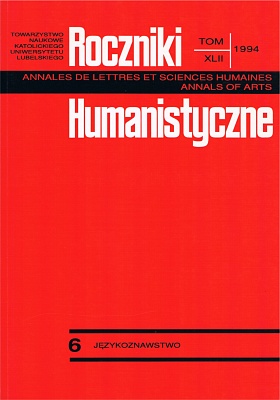Biblical Mode of Expression m Henryk Sienkiewicz’s Historical Novels
Abstract
It is almost a truism to say that Sienkiewicz belongs to the greatest masters of the Polish language. As of yet, however, this part of his writing has rarely been dealt with. The question o f biblical mode of expression has so far been almost totally neglected by researchers. Due to the writer’s profuse literary output the scope of material under analysis has been confined to historical novels, referring to the past of Poland. These novels constitute the main core of the literary work of the author of Trilogy. This review of the nineteen volumes of historical novels as regards their links with the Bible bears merely the character of a record and makes a material for further research.
Thanks to the impact of the Bible and often contacts with its text, a lot of expressions and phraseological relations have undergone considerable transformations and have become popular in everyday language. We shall be interested here only with these Biblical passages which play the function of literary allusions, or else are a conscious exploitation of the Bible’s text by the author for artistic purposes. While discussing them, we shall turn our attention to the role which they play in the new context.
- The impact of the Bible in Sienkiewicz’s novels is tremendous and varied. For Sienkiewicz’s figures this Book is a kind of commentary to history. In its light they explain the sense of national experiences and lives of particular people. The Bible inspires his novels in many ways. We find, for instance, a number of apocalyptic motifs in them (especially in Ogniem i mieczem) which make a philosophical interpretation of some stormy events in seventeenth-century Poland. The Bible is also to a broad extent "the Book of human affairs", that is why heroes refer to it and in its light seek to interpret their own experiences. They find in a part of themselves. The biblical word has often the form of comparison, which Sienkiewicz particularly liked.
- Another important group of "biblical passages" is references which serve to characterize the hero, and especially to morally evaluate his deeds. Several times Sienkiewicz has used the prophetic mode of expression in construing his figures (Wasyl Kurcewicz, Chmielnicki, and especially Fr Kordecki). The vast part of biblical references bears a particular meaning for the definition of the system of norms and values which govern the conduct, feelings and thoughts of the heroes.
- Biblical references often play the function of an argument in polemics. They appear in the language of the heroes or the narrator, supporting their words with the authority of the Holy Book.
- A separate group is made up of these passages in which Sienkiewicz enriches a prayer with a quotation or biblical allusion.
- Among many examples of biblical modes of expression there is a number of borrowings bearing the character of parody or humor, which are the source of comicality resulting from the contrast between gravity and dignity of the Bible’s word and a non-religious, often trifle content, The majority of this type of allusions is found in the language of Zagłoba.
The analysis of biblical inspirations in Sienkiewicz’s historical novels proves that the writer knew and in many ways used the biblical text, both within the artistic form and ideas. This intense permeation of the biblical word is not only an external characteristic of this writing. The Bible is present in it as a living Book. The heroes of Sienkiewicz’s novels adhere to the truth contained in the Bible in all circumstances of their lives. They interpret in its light their own lives and the sense of historical events; the history of the biblical figures is a prototype for them of all existential experiences. The moral message of the Holy Book is a point of reference for the recognition and moral evaluation of people’s attitudes.
Copyright (c) 1994 Roczniki Humanistyczne

This work is licensed under a Creative Commons Attribution-NonCommercial-NoDerivatives 4.0 International License.





